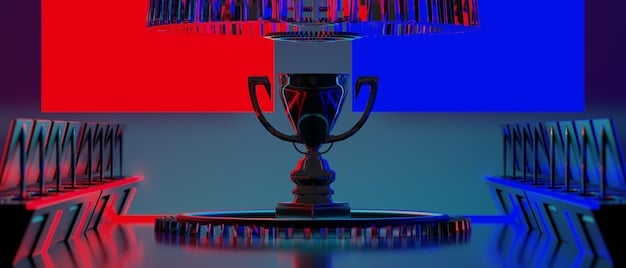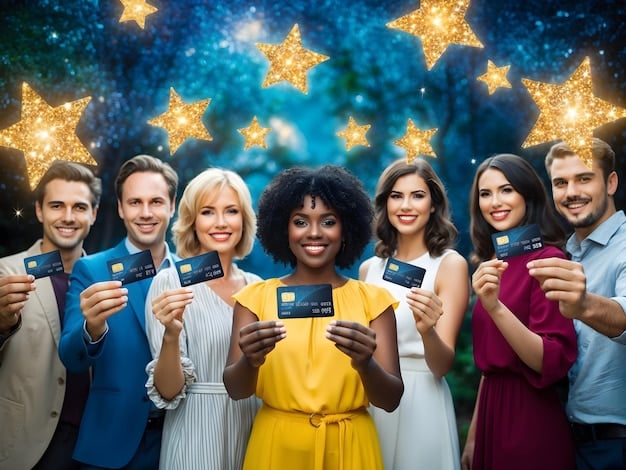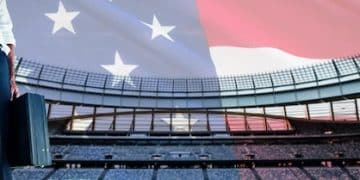Champions League Sponsorship: Which US Brands Lead in 2025?

In 2025, US brands are significantly investing in Champions League sponsorship deals to leverage the tournament’s global reach, with companies like Nike, Mastercard, and PepsiCo leading the way due to their strategic alignment with sports marketing and brand visibility objectives.
The Champions League, a prestigious annual club football competition, is a global stage for top teams and players. It also presents a lucrative opportunity for brands seeking worldwide exposure. Let’s explore which Champions League Sponsorship Deals: Which US Brands are Investing the Most in 2025?.
The Allure of Champions League Sponsorship for US Brands
The Champions League isn’t just a football tournament; it’s a marketing goldmine. US brands recognize the immense value in associating with such a high-profile event. The global viewership and the prestige of the competition offer unparalleled visibility.
Sponsorship of the Champions League allows US brands to tap into a massive and diverse audience. This drives brand awareness, fosters customer loyalty, and ultimately boosts sales.
Global Reach and Brand Visibility
One of the primary reasons US brands flock to Champions League sponsorships is the tournament’s extensive global reach. Matches are broadcast in over 200 countries, attracting billions of viewers. This provides a platform for brands to showcase their products and services to a truly international audience.
Moreover, the positive association with a prestigious sporting event like the Champions League enhances brand image and credibility. It creates a halo effect, associating the brand with excellence and high performance.
Strategic Alignment with Marketing Objectives
US brands often align their Champions League sponsorships with broader marketing strategies. For instance, a sports apparel company like Nike might sponsor the tournament to promote its latest football gear. Similarly, a beverage company like PepsiCo could use the platform to launch new products or campaigns.
By strategically integrating sponsorship with their overall marketing efforts, US brands can maximize their return on investment and achieve specific business goals, such as increasing market share or enhancing brand perception.
- Brand Awareness: Increase visibility among a global audience.
- Customer Loyalty: Foster positive brand associations with sports enthusiasts.
- Market Expansion: Reach new markets and demographics through targeted campaigns.
- Product Promotion: Showcase products and services to a highly engaged audience.
The Champions League offers a unique opportunity for US brands to connect with consumers on an emotional level. By associating with the passion and excitement of the tournament, brands can create lasting impressions and build meaningful relationships with their target audience.
Nike: A Long-Standing Partnership
Nike’s presence in the Champions League is undeniable. As a leading sportswear brand, Nike has a long history of sponsoring the tournament, equipping numerous teams and players. Their investment reflects a strategic commitment to football and its global appeal.
The partnership between Nike and the Champions League is mutually beneficial, enhancing Nike’s brand image while supporting the tournament’s growth and development.
Equipping Teams and Players
Nike provides kits, footwear, and other equipment to several participating teams, ensuring their brand is prominently displayed on the field. They also sponsor individual players, leveraging their star power to promote Nike products.
By aligning with successful teams and athletes, Nike reinforces its image as a leader in sports innovation and performance. This association resonates with fans and consumers, driving brand preference and sales.
Advertising and Brand Activation
In addition to equipping teams and players, Nike invests heavily in advertising and brand activation throughout the Champions League season. Their commercials and campaigns are strategically placed to maximize viewership and engagement.
Nike’s presence extends beyond traditional advertising. They create immersive fan experiences, host events, and leverage social media to connect with fans. This multifaceted approach ensures their brand remains top-of-mind throughout the tournament.

Through their long-standing partnership, Nike has successfully integrated its brand into the fabric of the Champions League. Their investment reflects a deep understanding of the power of sports marketing and its ability to drive business results.
PepsiCo: Engaging Fans Through Entertainment
PepsiCo is another major US brand that leverages the Champions League to engage with fans worldwide. Known for their innovative marketing campaigns, PepsiCo brings a unique blend of entertainment and refreshment to the tournament.
PepsiCo’s sponsorship strategy revolves around creating memorable experiences for fans, enhancing their enjoyment of the Champions League.
Sponsorship of Halftime Shows and Fan Zones
PepsiCo sponsors halftime shows and fan zones, providing entertainment and refreshments to fans attending matches. These activities create a festive atmosphere, enhancing the overall experience of the tournament.
By aligning their brand with positive and engaging experiences, PepsiCo strengthens its connection with fans and reinforces its image as a fun and youthful brand.
Leveraging Influencers and Social Media
PepsiCo also leverages influencers and social media to reach a broader audience. They partner with popular football personalities and celebrities to create engaging content and promote their products.
Through social media campaigns, PepsiCo encourages fans to share their experiences, fostering a sense of community and excitement around the Champions League. This approach allows them to connect with consumers on a personal level, driving brand loyalty and engagement.
PepsiCo’s approach to Champions League sponsorship is characterized by creativity and innovation. Their focus on entertainment and fan engagement sets them apart, ensuring their brand remains relevant and appealing to a diverse audience.
Mastercard: Connecting Through Priceless Experiences
Mastercard uses its Champions League sponsorship to offer “Priceless” experiences to cardholders. This strategy aligns with their brand promise of providing exclusive and unforgettable moments.
By connecting with fans through unique opportunities, Mastercard aims to strengthen its relationship with customers and enhance brand loyalty.
Offering Exclusive Access and Perks
Mastercard provides cardholders with exclusive access to Champions League matches, VIP experiences, and meet-and-greets with players. These perks create a sense of privilege and excitement, reinforcing the value of being a Mastercard customer.
By offering unique and desirable experiences, Mastercard differentiates itself from competitors and strengthens its position as a leading payment technology company.
Creating Emotional Connections with Fans
Mastercard’s sponsorship strategy focuses on creating emotional connections with fans. They tell stories of passion, dedication, and triumph, resonating with the values of the Champions League.
Through these stories, Mastercard aims to inspire and connect with consumers on a deeper level, fostering a sense of loyalty and affinity for the brand.

Mastercard’s commitment to providing “Priceless” experiences sets them apart in the world of sports sponsorship. By focusing on customer engagement and emotional connection, they create lasting impressions and drive brand loyalty.
Other US Brands with a Foot in the Door
While Nike, PepsiCo, and Mastercard are the dominant forces, other US brands are also making inroads into Champions League sponsorship. These companies recognize the value of associating with a global sporting event and are exploring innovative ways to engage with fans.
These brands often target specific demographics or markets, leveraging sponsorship to achieve niche marketing objectives.
Smaller Brands Leveraging Regional Opportunities
Smaller US brands may focus on regional sponsorship opportunities, targeting specific geographic markets within Europe. This approach allows them to achieve greater visibility and impact within a defined area.
By partnering with local teams or events, these brands can connect with consumers on a more personal level, fostering brand loyalty and driving sales.
Emerging Tech Companies and Their Growing Interest
Emerging tech companies are also showing growing interest in Champions League sponsorship. These companies see the tournament as a platform to showcase their innovative products and services to a tech-savvy audience.
By aligning with a high-profile sporting event, these companies can enhance their brand image and credibility, attracting investors and customers.
- Targeted Marketing: Reach specific demographics or geographic markets.
- Innovation Showcase: Highlight new products and services to a global audience.
- Brand Enhancement: Associate with a prestigious event to improve brand image.
- Networking Opportunities: Connect with potential partners and investors.
The Champions League provides a diverse range of sponsorship opportunities, catering to brands of all sizes and industries. As the tournament continues to grow in popularity, more US brands are likely to explore ways to get involved.
The Future of US Sponsorship in the Champions League
The future of US sponsorship in the Champions League looks promising. As the tournament’s global reach expands and its commercial value increases, more US brands are likely to invest in partnerships.
Innovation and technology will play a key role in shaping the future of Champions League sponsorship. Brands will leverage data analytics, artificial intelligence, and virtual reality to create more personalized and engaging experiences for fans.
Innovation and Technology Driving New Opportunities
Technological advancements are creating new opportunities for US brands to engage with Champions League fans. From interactive apps to virtual reality experiences, brands are exploring innovative ways to connect with consumers.
Data analytics allows brands to track fan behavior and preferences, enabling them to create more targeted and effective marketing campaigns. Artificial intelligence can be used to personalize fan experiences, delivering relevant content and offers.
The Evolving Landscape of Sports Marketing
The landscape of sports marketing is constantly evolving, with new trends and strategies emerging all the time. US brands must stay ahead of the curve to maximize their return on investment in Champions League sponsorship.
Content creation, social media engagement, and influencer marketing are becoming increasingly important. Brands must create compelling stories and experiences that resonate with fans, fostering loyalty and advocacy.
The Champions League will continue to be a key platform for US brands seeking global exposure and engagement. As the tournament evolves, brands must adapt their strategies to remain relevant and competitive, leveraging innovation and technology to create memorable experiences for fans.
| Key Point | Brief Description |
|---|---|
| 🌍 Global Reach | Champions League offers extensive reach to global audience. |
| ⚽ Brand Visibility | Sponsorship boosts brand visibility among sports enthusiasts. |
| 🤝 Partnerships | Nike, Pepsi, and Mastercard lead sponsorship investments. |
| 🚀 Future Trends | Technology drives new sponsorship and fan engagement. |
Frequently Asked Questions
▼
US brands invest in Champions League sponsorships to leverage the tournament’s global reach, enhance brand visibility, and foster customer loyalty. It’s a strategic move to connect with a massive and diverse audience.
▼
Nike, PepsiCo, and Mastercard are among the biggest US brands investing in Champions League sponsorships. They each utilize different strategies, from equipping teams to offering exclusive experiences.
▼
These sponsorships provide US brands with increased brand awareness, improved brand image, and opportunities to engage with customers on a global scale, leading to enhanced brand loyalty and sales.
▼
Technology plays a crucial role, with brands leveraging data analytics, AI, and VR to create personalized fan experiences and targeted marketing campaigns, maximizing engagement and ROI from their sponsorships.
▼
Future trends include greater use of technology for fan engagement, a focus on creating personalized experiences, and an emphasis on content creation and social media marketing to connect with fans on a deeper level.
Conclusion
In conclusion, US brands are strategically leveraging Champions League sponsorship deals to enhance global visibility and connect with diverse audiences. Key players like Nike, PepsiCo, and Mastercard are innovating their approaches, paving the way for emerging brands to explore new opportunities in this evolving landscape.





